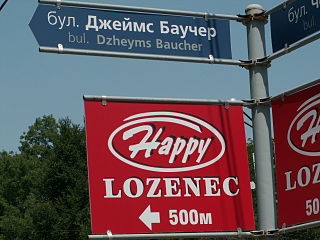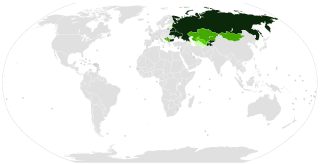| |||||
| Decades: | |||||
|---|---|---|---|---|---|
| See also: | |||||
Events in the year 1897 in Bulgaria .
| |||||
| Decades: | |||||
|---|---|---|---|---|---|
| See also: | |||||
Events in the year 1897 in Bulgaria .
| | This section needs expansion. You can help by adding to it. (August 2020) |
Bulgarian is an Eastern South Slavic language spoken in Southeast Europe, primarily in Bulgaria. It is the language of the Bulgarians.

The Bulgarian Cyrillic alphabet is used to write the Bulgarian language. The Cyrillic alphabet was originally developed in the First Bulgarian Empire during the 9th – 10th century AD at the Preslav Literary School.

The Communist Party of Bulgaria is a communist party in Bulgaria, currently led by Aleksandar Paunov.

Romanization of Bulgarian is the practice of transliteration of text in Bulgarian from its conventional Cyrillic orthography into the Latin alphabet. Romanization can be used for various purposes, such as rendering of proper names and place names in foreign-language contexts, or for informal writing of Bulgarian in environments where Cyrillic is not easily available. Official use of romanization by Bulgarian authorities is found, for instance, in identity documents and in road signage. Several different standards of transliteration exist, one of which was chosen and made mandatory for common use by the Bulgarian authorities in a law of 2009.
Bulgarian United Communist Party was a political party in Bulgaria. The party was founded on December 11, 1993. It was led by Atanas Vasilev and Mihail Mihaylov. Its formation was published in the State Gazette in 1994.

I with macron is a letter of the Cyrillic script. In Tajik, it represents a stressed close front unrounded vowel at the end of a word. In Kildin Sami on the Kola Peninsula and Mansi in western Siberia, it represents long. In those languages, vowel length is distinctive, and the macron marks the long version of vowels.

Numerous Cyrillic alphabets are based on the Cyrillic script. The early Cyrillic alphabet was developed in the 9th century AD and replaced the earlier Glagolitic script developed by the Byzantine theologians Cyril and Methodius. It is the basis of alphabets used in various languages, past and present, Slavic origin, and non-Slavic languages influenced by Russian. As of 2011, around 252 million people in Eurasia use it as the official alphabet for their national languages. About half of them are in Russia. Cyrillic is one of the most-used writing systems in the world. The creator is Saint Clement of Ohrid from the Preslav literary school in the First Bulgarian Empire.

Capital punishment in Bulgaria was abolished on December 12, 1998 with the last execution, that of attempted saboteur Georgi Alinski, having been carried out on November 4, 1989. The Parliament of Bulgaria had introduced a moratorium on July 7, 1990 and protocol number six of the European Convention on Human Rights came into force on October 1, 1999.

Elitsa and Stoyan are a Bulgarian music duo. In 2007, Elitsa Todorova and Stoyan Yankoulov were the entry for Bulgaria at the Eurovision Song Contest 2007. Their 5th place with the song "Water", was the highest Bulgaria had placed until the Eurovision Song Contest 2016. In March 2013 the duo were selected to represent Bulgaria for a second time at the Eurovision Song Contest 2013, in Malmö, Sweden. They performed in the second semi-final on 16 May 2013 with the song "Samo Shampioni", but did not qualify for the final.
Bulgarophiles is a term used for Slavic people from the regions of Macedonia and Pomoravlje who are ethnic Bulgarians. In Bulgaria, the term Bulgaromans; refers to non-Slavic people such as Aromanians with a Bulgarian self-awareness. In the 20th century, Bulgarophiles in neighboring Yugoslavia and Greece were considered enemies of the state harboring irredentist tendencies.
This article discusses the phonological system of Standard Bulgarian. While there is general scholarly consensus that contemporary Bulgarian has 45 phonemes, different authors place the real number of Bulgarian phonemes anywhere between 28 (27) and 47, largely depending on how palatal consonants are treated and on whether phonemes that primarily appear in borrowed foreign words are included in or excluded from the Bulgarian phonemic inventory.

Žeravino or Zheravino is a divided village in easternmost Serbia and westernmost Bulgaria. The Bulgarian half of the village is part of Kyustendil municipality, Kyustendil Province, whereas the Serbian part belongs to Bosilegrad municipality, Pčinja District.
Bulgarian Braille is a braille alphabet for writing the Bulgarian language. It is based on the unified international braille conventions, with braille letters approximating their Latin transliteration, and the same punctuation, with the French question mark. In Bulgarian, it is known as Брайлова азбука "braille alphabet".
Emiliya Ivanova Tsvetkova, known professionally as Emanuela is a Bulgarian pop-folk singer. In 2006, she signed with Ara Music. From 2008 to 2013 she released three albums before departing Ara in mid-2015, after she decided not to renew her contract. Following the departure, she signed with Payner.
Events in the year 2018 in Bulgaria.
Events in the year 1974 in Bulgaria.
Events in the year 1915 in Bulgaria.

The 2021 Bulgarian Cup final was the final match of the 2020–21 Bulgarian Cup and the 81st final of the Bulgarian Cup. The final took place on 19 May 2021 at Vasil Levski National Stadium in Sofia.

The Left Union for a Clean and Holy Republic was a Bulgarian left-wing nationalist electoral alliance which ran in the July 2021 Bulgarian parliamentary election and in the 2021 Bulgarian general election.